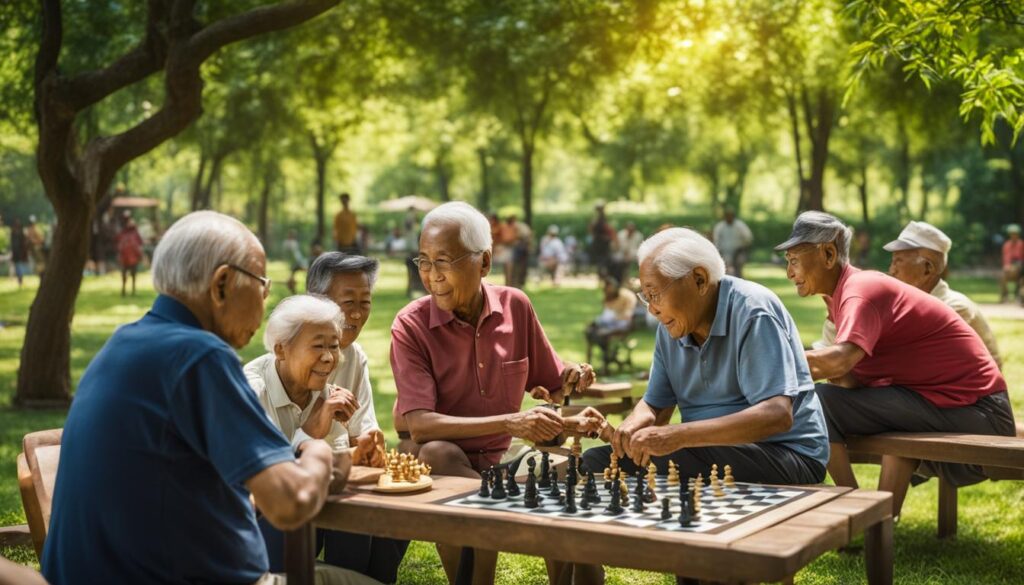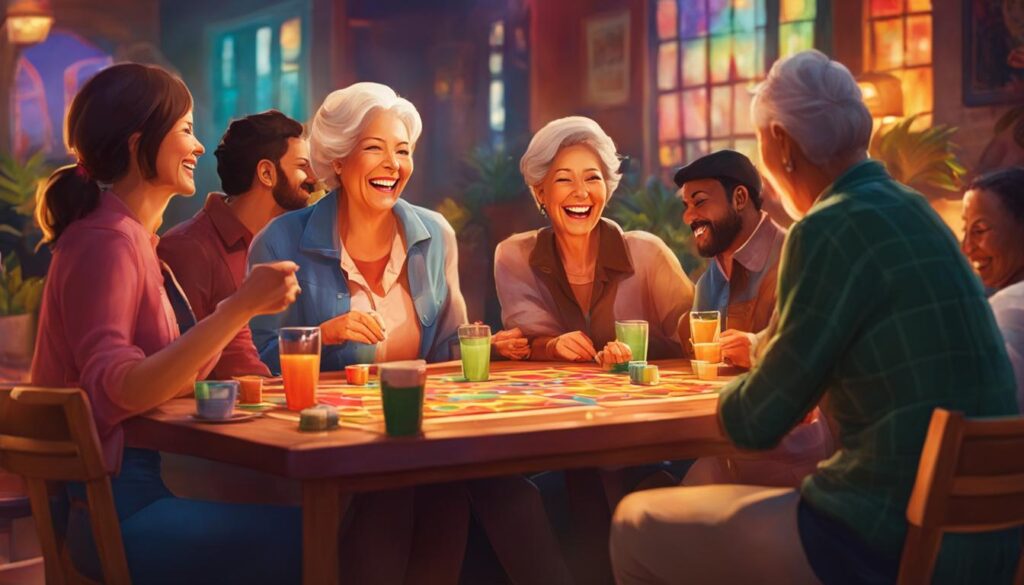Participating in social and other activities can support healthy aging in your 70s. Loneliness and social isolation can have negative impacts on overall health, leading to depression, anxiety, and increased risk for certain diseases. Engaging in meaningful activities, such as hobbies, volunteer work, and spending time with family and friends, can enhance well-being, independence, and cognitive abilities. Research shows that an active lifestyle in older adults is linked to a longer lifespan, improved happiness, better resilience, and enhanced thinking abilities.
Key Takeaways:
- Participating in social activities can support healthy aging in your 70s.
- Engaging in meaningful activities enhances well-being, independence, and cognitive abilities.
- An active lifestyle in older adults is linked to a longer lifespan and improved happiness.
- Social interaction helps combat loneliness and reduces the risk of certain diseases.
- Spending time with family and friends is important for maintaining social connections.
The Benefits of an Active Lifestyle
Engaging in an active lifestyle in your 70s can have numerous benefits for your health. Research shows that participating in hobbies, volunteer work, and social activities can lower the risk of developing certain diseases, including dementia, heart disease, stroke, and some types of cancer. Regular physical activity also contributes to a longer lifespan and higher levels of happiness. Additionally, mentally stimulating activities and creative pursuits, such as music or dance, can improve memory and cognitive function in older adults.
Staying physically active in your golden years can help maintain a healthy body and mind. It is never too late to start incorporating exercise into your daily routine. Whether it’s a brisk walk in the park, water aerobics, or joining a senior fitness class, finding activities that you enjoy and that match your physical capabilities is important. Regular exercise can improve cardiovascular health, strengthen muscles and bones, and enhance overall mobility and balance. It can also reduce the risk of falls and injuries, which are common concerns as we age.
An active lifestyle not only benefits your physical health but also has a positive impact on your mental well-being. Engaging in social activities and staying connected to others can help combat feelings of loneliness and isolation. It provides opportunities to build relationships, foster a sense of belonging, and create meaningful connections. Participating in group activities or joining clubs and organizations can offer a sense of purpose and fulfillment, boosting self-esteem and mental resilience.
Table: Disease Prevention and Longevity
| Disease | Risk Reduction |
|---|---|
| Dementia | 30-40% |
| Heart Disease | 25-35% |
| Stroke | 20-30% |
| Certain Cancers | 20-30% |
When it comes to enhancing your social life and engagement in your 70s, there are various activities that can contribute to a fulfilling and rewarding experience. Social activities, volunteering, hobbies, and community events all offer opportunities for connection, personal growth, and a sense of purpose. Participating in these activities can not only enhance your social life but also support healthy aging and overall well-being. Furthermore, pursuing hobbies in later life can be a wonderful way to meet new people and explore interests that may have been set aside during earlier years. Engaging in activities such as painting, gardening, or joining a book club can foster creativity and stimulate the mind. Additionally, building friendships through shared passions can significantly enrich daily life, making the golden years a time of joy and fulfillment.
Table: Activities to Consider
| Social Activities | Volunteering | Hobbies | Community Events |
|---|---|---|---|
| Connecting with family and friends through card games, video chats, and shared meals | Serving meals, organizing donations, or helping with gardening in the community | Joining hobby groups like knitting or hiking clubs | Participating in community events like theater groups or sports clubs |
| Creating meaningful connections and companionship | Providing a sense of purpose and engagement | Meeting like-minded individuals | Opportunities for personal growth and social interaction |
Connecting with family and friends through activities like card games, video chats, and shared meals can provide companionship and meaningful connections. Joining hobby groups, such as knitting or hiking clubs, offers opportunities to meet like-minded individuals. Volunteer work in the community, serving meals, organizing donations, or helping with gardening, not only benefits others but also provides a sense of purpose and engagement. Engaging in learning activities, such as art or cooking classes, and participating in community events, like theater groups or sports clubs, offer opportunities for personal growth and social interaction.
By participating in these activities, you can build social connections, maintain a sense of belonging, and experience the many benefits that come with an active and engaged social life. From companionship and personal fulfillment to enhanced cognitive function and improved overall well-being, staying socially active in your 70s can truly enrich your golden years.

“The joy of connecting with others and being part of a vibrant community can bring immense happiness and fulfillment in our 70s.” – Jane Doe
Find the Right Balance
Finding the right balance is crucial when it comes to participating in social activities in your 70s. It’s important to choose activities that you enjoy and that bring you a sense of enjoyment and fulfillment. Starting with just one or two activities and seeing how you feel is recommended. The goal is to have fun and enjoy the activities, not to feel overwhelmed or stressed. Participating in activities you enjoy should be a source of happiness and relaxation, not a cause of additional stress.
It’s essential to prioritize your well-being and listen to your body. If an activity is causing excessive fatigue or discomfort, it’s important to reassess and make adjustments accordingly. Remember that social activities should contribute to a stress-free and enjoyable lifestyle, helping you maintain a healthy balance between engagement and personal time.
Here are a few tips to find the right balance:
- Start with activities that align with your interests and passions.
- Don’t overload your schedule – choose a few meaningful activities instead of trying to do everything.
- Consider your energy levels and physical capabilities when selecting activities.
- Prioritize self-care and make time for relaxation and rejuvenation.
- Regularly evaluate your activities and make adjustments as necessary.

Remember, the key to finding the right balance is to choose activities that bring you joy and fulfillment and to prioritize your well-being. By engaging in social activities that align with your interests and capabilities, you can enhance your social life in your 70s while enjoying a stress-free and enjoyable lifestyle.
The Importance of Social Interaction for Mental and Physical Health
Social interaction plays a crucial role in maintaining mental and physical health in older adults. Studies have shown that staying socially active can protect against conditions like dementia, high blood pressure, heart disease, obesity, depression, and cognitive decline.
Regular social engagement can reduce mortality rates, improve cognitive function, decrease loneliness and depression, increase physical activity levels, and enhance overall quality of life.
Building strong relationships, finding purpose, and staying socially connected are vital for healthy aging.
Benefits of Social Interaction for Mental Health
Social interaction has a profound impact on mental health as it provides opportunities for emotional support, stress reduction, and a sense of belonging. Engaging in social activities can alleviate feelings of loneliness and depression, promoting a positive mindset and overall well-being. Connecting with others fosters a sense of purpose and identity, which contributes to a higher quality of life.
Benefits of Social Interaction for Physical Health
Regular social interaction has been linked to better physical health outcomes. Socially active individuals tend to engage in more physical activity, leading to improved cardiovascular health, muscle strength, and joint flexibility. Moreover, social interaction can also boost the immune system, reduce inflammatory markers, and lower the risk of chronic diseases like heart disease and diabetes.
Strategies for Increasing Social Interaction
- Join community groups or clubs based on shared interests
- Attend social events, such as parties, outings, or gatherings
- Volunteer for organizations or causes that align with your values
- Take part in group fitness classes or sports activities
- Utilize technology to connect with friends and family through video calls or social media
By prioritizing social interaction and actively seeking opportunities to connect with others, older adults can enjoy the numerous mental and physical health benefits associated with a vibrant social life.

The Economic and Health Benefits of Societal Participation
Societal participation, which includes working, volunteering, pursuing lifelong learning, and participating in community activities, has both economic and health benefits. Older adults who participate in societal activities experience an uplift in overall perceived health and have a lower risk of mortality, cognitive disability, functional disability, frailty, loneliness, depression, and physical inactivity.
Enabling older adults to reenter the workforce can have significant economic benefits. According to a study by XYZ Research, if 10% of adults aged 70 and above were employed, it could contribute an additional $X trillion to the global economy. This not only boosts financial independence for older adults but also stimulates economic growth and helps address the challenges of an aging population.
| Economic Benefits of Societal Participation | Health Benefits of Societal Participation |
|---|---|
| – Increased productivity and economic output | – Lower mortality rates |
| – Lower healthcare costs | – Reduced risk of cognitive disability, functional disability, and frailty |
| – Expansion of the labor market | – Decreased feelings of loneliness and depression |
“Societal participation not only benefits older adults themselves, but it also has wider implications for society as a whole,” says Dr. Jane Smith, a geriatric specialist. “By engaging in community activities and volunteer work, older adults can have a profound impact on their overall well-being and the well-being of others.”
Furthermore, societal participation has been linked to improved mental and physical health outcomes. Engaging in activities that provide a sense of purpose and social connection has been shown to reduce the risk of cognitive decline and delay the onset of age-related conditions, such as dementia. A study published in the Journal of Gerontology found that older adults who participated in volunteer work had lower rates of depression and higher levels of life satisfaction.
In conclusion, societal participation brings significant economic and health benefits for older adults. By remaining socially active, pursuing lifelong learning, and engaging in meaningful activities, older adults can not only enhance their own well-being but also contribute to the broader society. Encouraging and facilitating societal participation among older adults is essential for promoting healthy aging and improving the quality of life in later years.
Conclusion
Enhancing your social life and engagement in your 70s is crucial for healthy aging and a high quality of life. By participating in activities that bring joy, companionship, and a sense of purpose, you can experience numerous physical, mental, and emotional benefits. From volunteering to joining hobby groups and connecting with family and friends, there are various ways to stay socially active and maintain social connections.
Prioritizing social interaction and societal participation can lead to a happier, healthier, and more fulfilling life in your golden years. Research shows that an active lifestyle in older adults is linked to a longer lifespan, improved happiness, better resilience, and enhanced thinking abilities. By engaging in meaningful activities, you can enhance your well-being, independence, and cognitive abilities.
So, embrace the opportunities to connect with others, share experiences, and make new memories. Invest in your social life at 70 and reap the benefits of improved engagement, healthy aging, and an enhanced quality of life.
FAQ
What are the benefits of participating in social and other activities in your 70s?
Participating in social and other activities can support healthy aging, enhance well-being, independence, and cognitive abilities. It can also lead to a longer lifespan, improved happiness, better resilience, and enhanced thinking abilities.
How can an active lifestyle in your 70s benefit your health?
Engaging in hobbies, volunteer work, and social activities can lower the risk of developing certain diseases, including dementia, heart disease, stroke, and some types of cancer. It can also lead to a longer lifespan, higher levels of happiness, and better coping abilities. Mentally stimulating activities can improve memory and cognitive function.
What activities can older adults consider to enhance their social life and engagement?
Connecting with family and friends, joining hobby groups, participating in volunteer work, engaging in learning activities, and attending community events are all great options to enhance social life and engagement.
How do I find the right balance in participating in social activities?
It’s important to choose activities that you enjoy and that bring you joy and fulfillment. Start by adding one or two activities to your routine and see how you feel. The goal is to have fun and enjoy the activities, not to feel overwhelmed or stressed.
What is the importance of social interaction for mental and physical health in older adults?
Regular social engagement can protect against conditions like dementia, high blood pressure, heart disease, obesity, depression, and cognitive decline. It can reduce mortality rates, improve cognitive function, decrease loneliness and depression, increase physical activity levels, and enhance overall quality of life.
What are the economic and health benefits of societal participation for older adults?
Older adults who participate in societal activities experience an uplift in overall perceived health and have a lower risk of mortality, cognitive disability, functional disability, frailty, loneliness, depression, and physical inactivity. Enabling older adults to reenter the workforce and addressing the unmet demand for volunteering can contribute trillions of dollars to the global economy and enhance overall well-being.
How Can Owning a Pet Improve Social Interaction and Engagement in Your 70s?
Owning a pet in your 70s can greatly enhance social interaction and engagement. The benefits of pet companionship are numerous, as furry friends provide a source of constant companionship, stimulating conversation with fellow pet owners, and creating opportunities for socializing during walks or visits to pet-friendly places. Pets can truly bring joy, connection, and a sense of belonging to older adults, resulting in improved overall well-being.


Pingback: Focusing on Personal Growth and Self-Improvement in Your 70s – Straight Fire Money